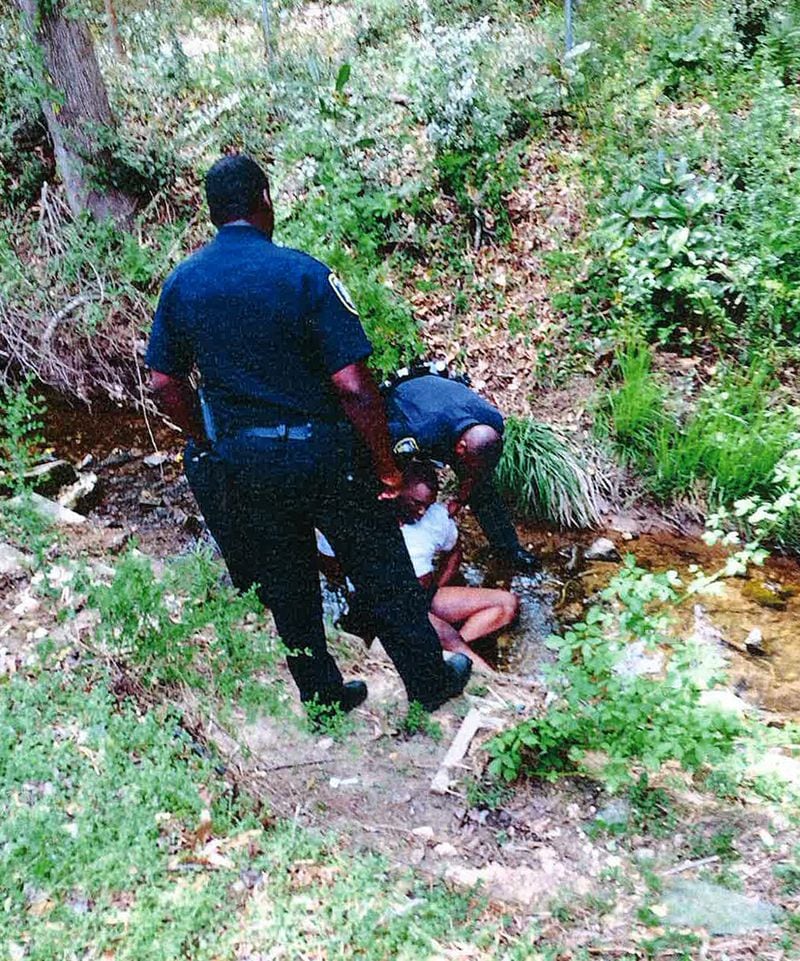The family of a 24-year-old man who died after he was repeatedly shocked with a Taser expected the former East Point police sergeant who murdered him to be sentenced Wednesday to life in prison.
And he was.
They were enraged, however, when his co-defendant, former Cpl. Howard Weems, was sentenced to 18 months in prison for the April 2014 death of Gregory Towns.
Weems expressed his condolences to the man’s family, then began to ask Judge Henry Newkirk for mercy, saying he had no knowledge of Towns’ poor health during his arrest and simply thought the suspect was trying to avoid going to jail.
“Don’t nobody care,” Aisel Smith, Towns’ girlfriend and the mother of his 3-year-old son, shouted as Weems spoke.
Smith was immediately escorted from the courtroom and wasn’t there to hear Weems’ sentence or the judge’s decision to let him delay prison until after the Christmas-New Year’s holiday. Towns’ relatives, including an aunt holding the hand of 3-year-old Dylan Towns, followed her to the hallway before Weems’ sentence was pronounced.
Fulton County District Attorney Paul Howard, who stressed that he did not ordinarily comment on a defendant’s statements during sentencing nor a judge’s punishment decision, agreed with Towns’ loved ones that Weems seemed to blame the victim for his own death and was unwilling to accept responsibility.
“It seemed to say it was his fault,” Howard said of Weems’ plea for mercy.
“I can’t accept his apology,” Smith said of Weems. “It’s not genuine. I felt he was making excuses. He’s not apologetic. He’s not sorry.”
Towns’ younger sister, Charity Barnes, fumed, “That’s not justice. He was murdered.”
A Fulton County jury on Friday took just 30 minutes to convict former police Sgt. Marcus Eberhart, 42, of felony murder. That same jury acquitted Weems of his murder charge but convicted him of two felonies — involuntary manslaughter and violating his oath of office — plus a misdemeanor, reckless conduct.
Weems’ 18-month sentence will start on Jan. 3. He will have to spend 3½ years on probation after he has served his prison time. Newkirk said Weems’ probation requirements include him speaking with at least 10 law enforcement agencies about Taser dangers. If he successfully completes his sentence, Weems’ conviction will be erased from his record.
“There are no winners here,” said Chief Senior Assistant District Attorney Clint Rucker, a member of the prosecution team.
The events that led to Towns’ death began when Smith called police to report a domestic incident at her condominium on April 11, 2014. Towns ran when police arrived, but Eberhart and Weems soon caught up with the 280-pound man as he was resting and trying to catch his breath about a mile from the condominium complex, The Atlanta Journal-Constitution reported at the time.
Towns begged them to let him rest before arresting him, but they insisted that he get to his feet and walk to the patrol car yards away. Towns fell down several times as he tried to walk out of a wooded area and across a creek.
Over the next 30 minutes, Towns, while handcuffed, was shocked with a Taser 14 times. At one point, the Tasers were repeatedly discharged even though Towns was sitting in a shallow creek; one of the officers complained about shocking himself, according to records the AJC obtained.
Towns died at the scene.
The medical examiner determined Towns’ death was a homicide, but also wrote in a report that Towns was overweight, hypertensive and had sickle cell trait. “Physical exertion and conducted electrical stimulation” contributed to his death, according to the report.
"They used their Tasers as a cattle prod on Mr. Towns," attorney Chris Stewart, the Towns family's attorney, said before filing a lawsuit on behalf of Towns' son, who was then 7 months old. East Point soon settled the lawsuit by paying the Towns family the maximum amount allowed by the city's insurance carrier, $1 million.
After the Georgia Bureau of Investigation concluded its investigation of Towns' death, Eberhart resigned and Weems was fired. The police chief also resigned several months later.
Weems referred to Towns’ health several times in the Wednesday sentencing.
“I had no knowledge of the condition of Mr. Towns,” Weems, 51, said. “Not one time did he say he was in medical distress. Mr. Towns was not exhibiting any medical distress. In my mind there was nothing wrong with him other than not wanting to go to jail.”
According to records and testimony, Towns repeatedly asked the officers for time to rest.
Smith challenged suggestions that Towns’ health issues may have caused his death. “He was electrocuted,” Smith said.
“I know God doesn’t make mistakes,” Smith continued, as her older son played with Towns’ 3-year-old nearby. “It was Gregory’s time to be called home. They were found guilty for what they did.”
Eberhart, through his attorney, and Weems both apologized to Towns’ family.
One by one Weems’ friends and relatives told Newkirk about Weems’ role in the family and his service in the military and on the police force.
“I ain’t never had no trouble with my son. Never,” Howard Weems said.
“He has beaten himself up more than what the court can do, more than what the media can do, more than what the district attorney can do,” said William McKenney, one of Weems’ lawyers.
He noted the number of police-involved shootings nationwide that, in some instances, resulted in questions from the public about why less-deadly force wasn’t used.
“Now we’re convicting a police officer for using less-deadly force,” McKenney said. “He’s punished enough. He carries this in Mr. Weems’ heart each and every day.”
About the Author








